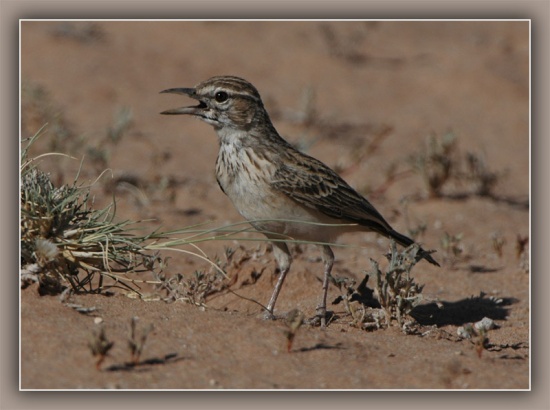(→Behaviour: Vocalisation) |
|||
| Line 19: | Line 19: | ||
Semi-arid shrublands and grassy shrublands (karroid vegetation); usually rocky or stony areas. | Semi-arid shrublands and grassy shrublands (karroid vegetation); usually rocky or stony areas. | ||
==Behaviour== | ==Behaviour== | ||
| − | Usually seen alone or in pairs | + | Usually seen alone or in pairs. Forages on the ground for invertebrates and seeds; also eats fruit and small corms. |
| + | ====Vocalisation==== | ||
| + | The male sings from a perch, the ground, and while in aerial display. The call is a loud descending whistle ''peeeuuu'' lasting about a second (repeated every 8-15 seconds while perched). | ||
====Breeding==== | ====Breeding==== | ||
Monogamous and territorial. The nest is a cup of twigs and roots, sometimes with a partial dome; it is built on the ground at the base of a bush or stone. Two to three eggs are laid. | Monogamous and territorial. The nest is a cup of twigs and roots, sometimes with a partial dome; it is built on the ground at the base of a bush or stone. Two to three eggs are laid. | ||
Revision as of 16:55, 21 December 2008
- Certhilauda subcoronata
Identification
Length 18-22 cm, mass 35-47 cm. A large lark with a long, decurved bill. Upper parts are dark brown in the south to reddish in the north, streaked darker; streaking more marked in the south. Under parts whitish, streaked dark brown on the breast.
Distribution
Inland central and southern Namibia and western South Africa.
Taxonomy
Certhilauda subcoronata has four subspecies:1,2
- C. s. bradshawi
- Southern Namibia and north-western Northern Cape Province (South Africa)
- C. s. damarensis
- West-central Namibia
- C. s. subcoronata
- Inland western South Africa
- C. s. gilli
- Inland south-western South Africa
Habitat
Semi-arid shrublands and grassy shrublands (karroid vegetation); usually rocky or stony areas.
Behaviour
Usually seen alone or in pairs. Forages on the ground for invertebrates and seeds; also eats fruit and small corms.
Vocalisation
The male sings from a perch, the ground, and while in aerial display. The call is a loud descending whistle peeeuuu lasting about a second (repeated every 8-15 seconds while perched).
Breeding
Monogamous and territorial. The nest is a cup of twigs and roots, sometimes with a partial dome; it is built on the ground at the base of a bush or stone. Two to three eggs are laid.
References
- Clements, JF. 2008. The Clements Checklist of Birds of the World. 6th ed., with updates to December 2008. Ithaca: Cornell Univ. Press. ISBN 978-0801445019. Spreadsheet available at http://www.birds.cornell.edu/clementschecklist.
- Hockey, PAR, WRJ Dean, and PG Ryan, eds. 2005. Roberts' Birds of Southern Africa. 7th ed. Cape Town: John Voelcker Bird Book Fund. ISBN 978-0620340533
Recommended Citation
- BirdForum Opus contributors. (2024) Karoo Long-billed Lark. In: BirdForum, the forum for wild birds and birding. Retrieved 16 June 2024 from https://www.birdforum.net/opus/Karoo_Long-billed_Lark




